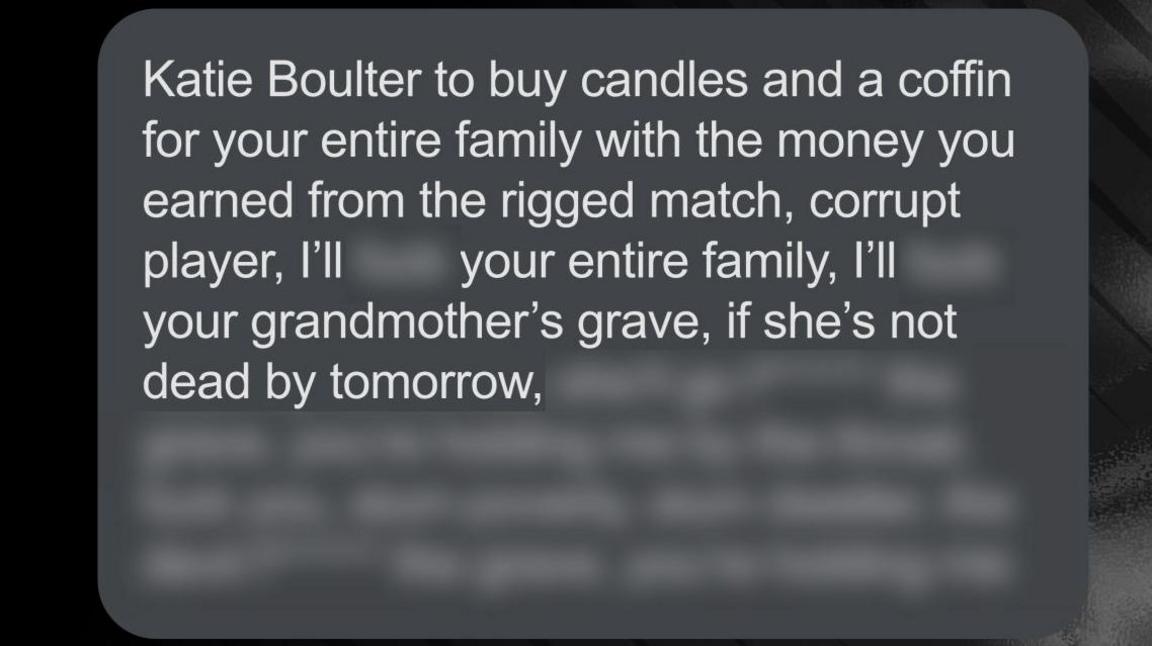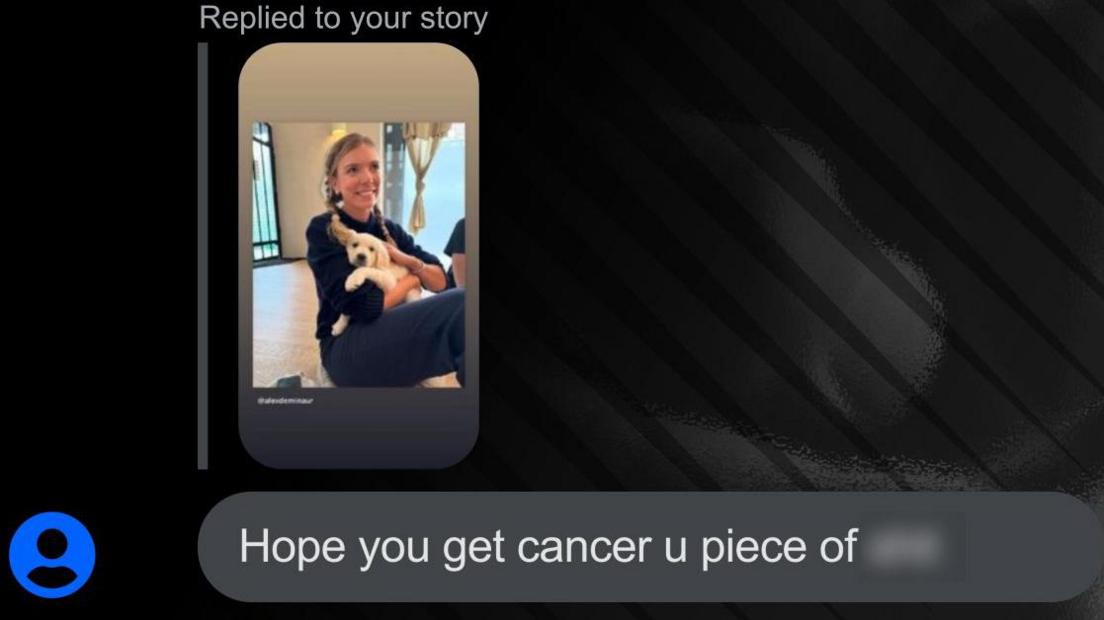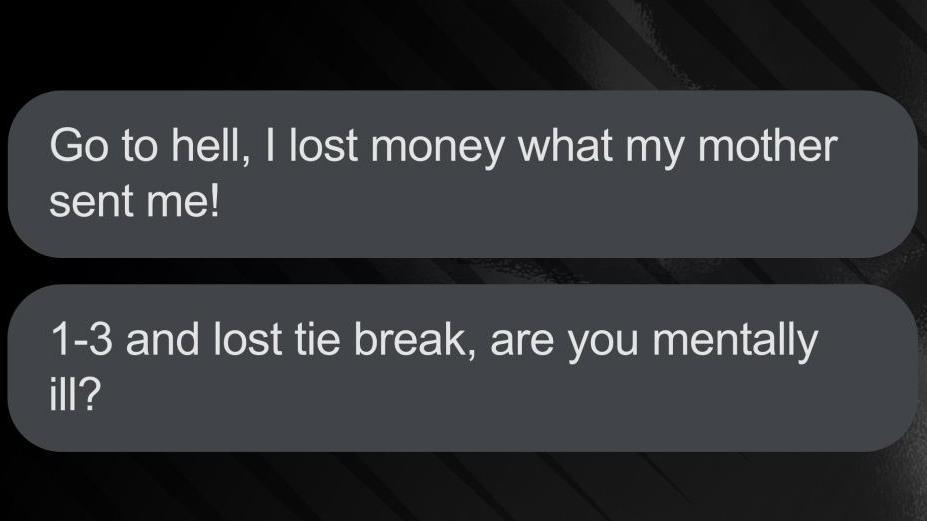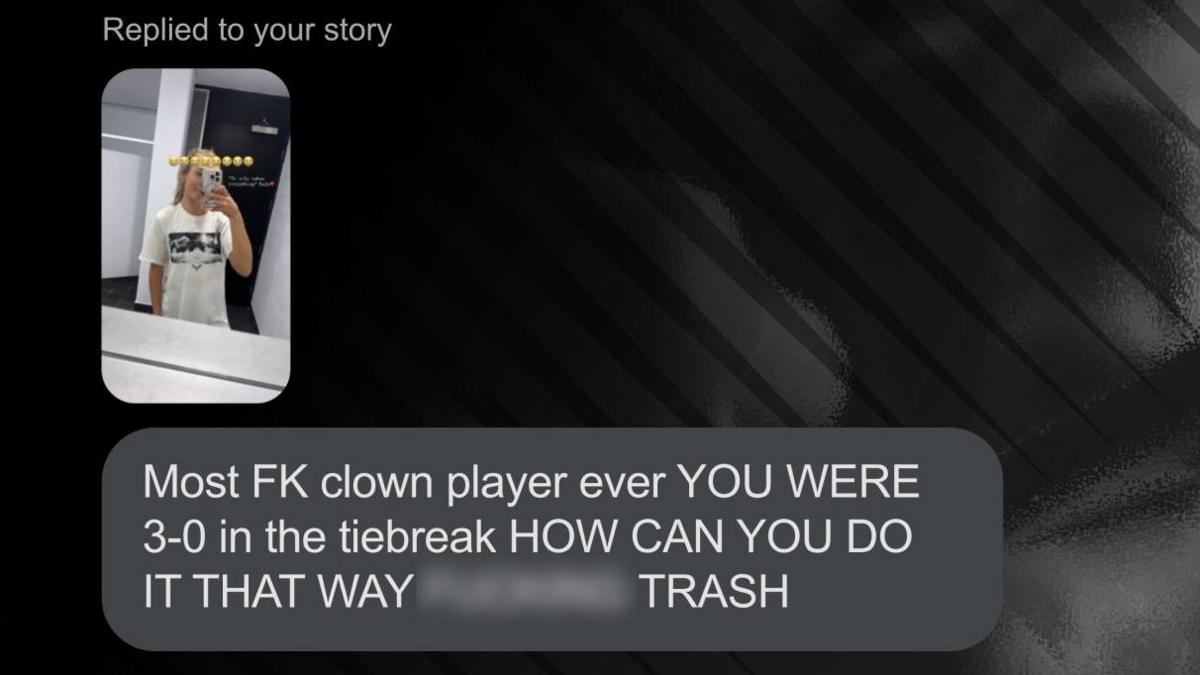Boulter shares messages of ‘disgusting’ online abuse
- 2 hours ago
Katie Boulter had just lost a tie-break at the French Open when the death threats started.
It did not matter that the Briton would go on to win the match.
“Hope you get cancer,” said one message.
Another – laced with expletives – referenced damaging her “grandmother’s grave if she’s not dead by tomorrow” and “candles and a coffin for your entire family”.
A third said: “Go to hell, I lost money my mother sent me.”
The British number two’s response, as she reads through them 10 days later, is a mix of despair, resignation and fear.
Boulter agreed to sit down with BBC Sport to provide unprecedented insight into the volume and nature of abuse received by players, including sharing screenshots of her private inbox.
‘It shows how vulnerable we are’
Boulter’s reasoning for sharing the messages is two-fold.
The first, she says, is abusive content like this has become “the norm”. Boulter, 28, also has fears about the impact it can have on younger players.
“At the very start of my career, it’s probably something I took very personally… getting comments about the way you look,” she says.
“It becomes more apparent every single time you go on your phone.
“I think it increases in number and it also increases in the level of things that people say. I don’t think there’s anything off the cards now.”
The message threatening her loved ones was sent during her French Open first-round match against Carole Monnet on 29 May.
After losing the first-set tie-break, Boulter rallied to win 6-7 (4-7) 6-1 6-1 – her first victory in the main draw at Roland Garros.
As she reflects on the messages she receives, she says it is hard to differentiate between those that constitute a genuine risk and those that do not.
“I think it just kind of shows how vulnerable we are,” Boulter says. “You really don’t know if this person is on site. You really don’t know if they’re nearby or if they know where you live or anything like that.”
Looking again at the message hoping she gets cancer, she shakes her head.
“I just wonder who the person is that has sent that,” she says.
“I don’t think it’s something that I would ever say to my worst enemy. It’s just an awful, awful thing to say to anyone. It’s horrible.”
-

Katie Boulter shared screenshots of her private inbox…
-

…showing the level of abuse she is subjected to.
-

Boulter says she receives “hundreds of messages after games, after points, after sets and after matches”
-

Boulter also receives messages abusing her fiance and fellow tennis player Alex de Minaur
-

Boulter says the level of abuse will be “pretty astronomical” at Wimbledon – her home Grand Slam
1 of 5
Calls to tackle abuse linked to betting
Boulter believes a lot of the abuse she is sent is from people who have placed bets on her matches, given it comes after victories as well as defeats.
She says she has become better at moving on from it, or simply not looking at her direct messages, but the impact is clear.
“As far as death threats, it’s just not something you want to be reading straight after an emotional loss,” she says.
“A lot of the time you get it after you win as well.”
Statistics shared exclusively with BBC Sport demonstrate the level of abuse aimed at players through social media, and what is being done to try to address it.
The figures – provided by data science firm Signify, the International Tennis Federation (ITF) and Women’s Tennis Association (WTA) – show that in 2024, about 8,000 abusive, violent or threatening messages were sent publicly to 458 tennis players through their social media accounts.
A significant proportion of abuse stems from betting, according to Signify, which has been working with tennis authorities on detecting abuse through an artificial intelligence-led detection system called Threat Matrix.
More than a quarter of all abuse (26%) was targeted at five players.
The most prolific account sent 263 abusive messages, and 15 accounts were escalated to law enforcement.
Nine of the 10 most prolific accounts – the majority of which were related to angry gamblers – were either suspended or had content removed.
Details of 39 account holders were shared with the tennis authorities and betting industry for further action.
Across the year, angry gamblers sent 40% of all detected abuse, with messages clearly related to betting activity because of the timing or content of the abuse.
Asked for a response, a Betting and Gaming Council spokesperson said its members “do not tolerate abuse on social media, which has no place in betting or sport”.
It added: “It is vital social media companies take swift action against users, and remove offensive content.”
Meta, which owns Instagram and Facebook, declined to provide a comment on the record but has developed various tools to try to prevent people from seeing abuse – including hiding and filtering offensive or unwanted comments or images and technology that tracks and removes abuse.
-
- 19 December 2024
-
- 21 February
‘Explicit pictures are a problem’
Boulter, who is ranked 39th in the world, says explicit images are another problem for players.
“I’ve had quite a few of those sorts of things,” says Boulter, though she did acknowledge she thought “a lot of things” were filtered out through Instagram.
“I have noticed that more in my hidden messages or requests, which is a place I don’t go to very often.
“That’s also a larger problem. Youngsters really shouldn’t be seeing things like that or being sent things like that.”
Boulter says she has occasionally engaged with those who have sent her abuse, in an effort to get them to think about what they have said.
She says: “I’ve just tried to send them a nice message [so] maybe they can take a second and look at themselves and go: ‘Oh, well maybe I shouldn’t have sent that.’
“Sometimes the replies I actually get from that is them saying: ‘Oh no, I’m a huge fan. I’m so sorry. I didn’t want to send you that stuff, but it was emotional, I didn’t mean to. You know, I still support you. I think you’re amazing.’
“They don’t realise sometimes what they’ve actually said to these people.”
Boulter is preparing for the level of abuse to increase when she plays at her home Grand Slam.
“Wimbledon for me would probably be pretty astronomical,” she explains, adding she also receives abuse based on the performances of her fiance – Australian world number 12 Alex de Minaur.
“As a couple, we actually both get a little bit from each other as well, so he tends to get some of my matches if I’ve lost, and if he’s lost then sometimes I get his and likewise sometimes when he’s won.
“You can get hundreds of messages after games, after points, after sets and after matches.”
-
- 26 March
Which other players have been affected?
Caroline Garcia, then the world number 30, spoke last year about the level of abuse players are subjected to.
The Frenchwoman pleaded for online trolls to remember players “are human”.
And she suggested tournaments partnering with betting companies added to the problems.
Five-time major champion Iga Swiatek and US Open finalist Jessica Pegula were among those who supported Garcia’s message.
Pegula described “constant death threats” and “family threats” as being “normal now”.
The American has joined others in the sport calling for the gambling industry to help tackle prolific and threatening message connected to betting.
“Online abuse is unacceptable, and something that no player should have to endure,” she said.
“It’s time for the gambling industry and social media companies to tackle the problem at its source and act to protect everyone facing these threats.”
In May 2023, American Taylor Townsend shared a screenshot of the death threat and racist abuse she received in an email after losing a match.
Sloane Stephens and Jay Clarke had previously revealed the level of racist abuse they were subjected to on social media.
Other sportspeople have also been targeted, including England footballers Marcus Rashford, Bukayo Saka and Jadon Sancho after Euro 2020.
What is being done to protect players?
Threat Matrix was first used by tennis authorities in January 2024 after collaboration between the ITF, WTA, All England Lawn Tennis Club (AELTC) and United States Tennis Association (USTA). It has been used in other sports over the past five years.
It covers WTA and ITF players throughout the year, with all competitors offered the service during Wimbledon and the US Open.
Players can also share abuse received through direct messages, and are offered security advice.
Sally Bolton – chief executive of AELTC – told BBC Sport social media has made existing levels of abuse “significantly worse”.
“We try very hard to protect the players when they’re on site and digitally we are investing in helping to support them to not have that abuse happen,” she said.
“It’s disappointing that athletes aren’t able to go about what they do without receiving that abuse, but unfortunately it is a reality, and betting on sport now I’m afraid is also a reality, so we have to think about how we can mitigate some of that threat and risk.”
The WTA and ITF told us protecting players from online abuse was “a key priority”.
“From law enforcement escalation and platform intervention to banning abusers from our events, perpetrators must understand that they will face consequences for their actions,” they said in a statement.
The WTA and ITF also defended the partnerships in place which share data with third-party organisations – including betting companies – insisting it increases regulation and generates income for projects such as Threat Matrix.
“Betting on sport is inevitable, so it is crucial that the data used for that purpose comes from one official source. This is why we have rigorously vetted partnerships with official data suppliers – without them, betting on tennis could take place in unregulated markets, based on unofficial data, for which there is no oversight and little or no deterrent to corruptors.”
Jonathan Hirshler – CEO of Signify Group – highlighted how a “significant proportion” of abuse comes from a “relatively small” number of accounts.
He added: “Constructive dialogue with betting operators, as well as social media platforms and law enforcement would be a positive next step to discuss what collective action can be taken to address these concerns.”
Related topics

-
- 31 January
